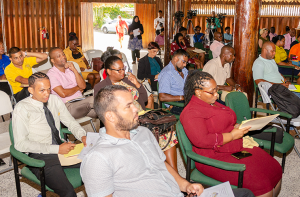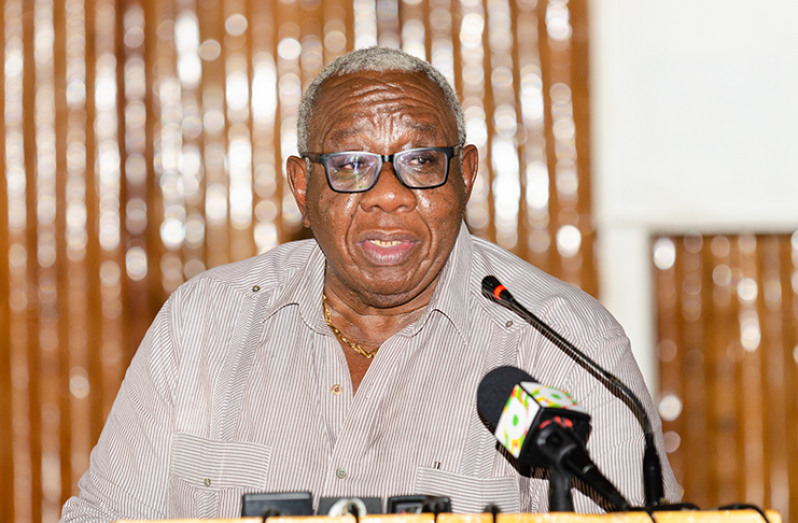– educators agree at TVET rebranding workshop
TECHNICAL, vocational education and training (TVET) is not second-class to traditional education, being it’s just as important in the development of a country, and the Ministry of Education (MoE) is working to ensure that this importance is correctly recognised.
This was emphasised by MoE Permanent Secretary Alfred King, and Chairman of the Council for TVET, and Board of Industrial Training (BIT) Clinton Williams when they spoke on Thursday at a TVET Workshop held at the Umana Yana.
“TVET should not be seen as an option or alternative. Technical education has to take its rightful place as part of the mainstream product, where you can achieve competence and certification to take you straight to the world of work or higher levels of education,” King stressed to an audience that included representatives from a number of education sectors.
The event was attended by heads of the varying TVET institutions, as well as representatives from the University of Guyana and Cyril Potter College of Education (CPCE); officers from the National Centre for Educational Resources Development (NCERD), and BIT; and the head teachers of several secondary schools among other education stakeholders.
The workshop, which was held under the theme, “Rebranding TVET in the decade of Green State Development; Streamlining TVET in Secondary Schools with particular emphasis on hinterland communities”, is part of other initiatives orchestrated by the Ministry of Education to reshape the image of TVET in Guyana.
TVET education has often been utilised by many school dropouts who did not fare well in the traditional school system. As such, over the years, it has developed an image as a programme catering primarily to such students, notwithstanding attracting many qualified students.
“It has been established internationally that there is a historical stigma to technical and vocational education, which leads to not enough being done; not enough people being directed to this area of work,” Williams noted.

As Guyana goes about rebranding the image of TVET nationally, Williams noted that the CTVET is targeting focus in areas applicable with economic sectors in Guyana.
Aside from oil and gas, which is considered a most topical sector, Williams said focus is also being placed on technical and vocational training for mining and mineral processing; agriculture and agro-processing; infrastructure development; information and communication technologies (ICT); and timber and timber processing.
Guyana’s initiative is also part of a wider initiative across the Caribbean to elevate the recognition and importance of TVET, as well as the development of standardised programmes that are recognised both across the Caribbean, regional and internationally.
“We want to have an inclusive national TVET system that meets the demand of global standards,” Williams said. “Our standards cannot simply be standards that are for ourselves, because we operate in a global world. And if we don’t fit, we will be uncompetitive in what we do,” he added.
Under the CARICOM Heads of Government agreement 2008, the Caribbean Examinations Council (CXC) was mandated to facilitate the issuing of the Caribbean Vocational Qualifications (CVQ) within secondary schools across the region.
Guyana currently has some 10 technical institutes distributed across the country, including in Linden, Essequibo, Berbice, and on the West Coast of Demerara among other places.
Additionally, beginning in September 2019, the MoE piloted CVQ programmes in 11 secondary schools to provide secondary school students with validation of skills.
King said that now is the time for TVET to be seen as an option for all students, and more focus will be placed on the area as the MoE goes forward, crafting a five-year strategic plan.
“The ministry is at that point where we’re reviewing developing our strategic plan that will guide the ministry’s delivery of education for the next five years. TVET will have to be a part of this work plan,” he said.
King, himself a former TVET instructor, also told the audience that TVET instructors and teachers also play a vital role in raising the standard of the image of TVET.
“Unless you demonstrate an understanding and pride in what you do, you would not help with the branding,” he said, adding: “We have to stop thinking what we’re doing is second-class to anything else that we offer.





.jpg)








